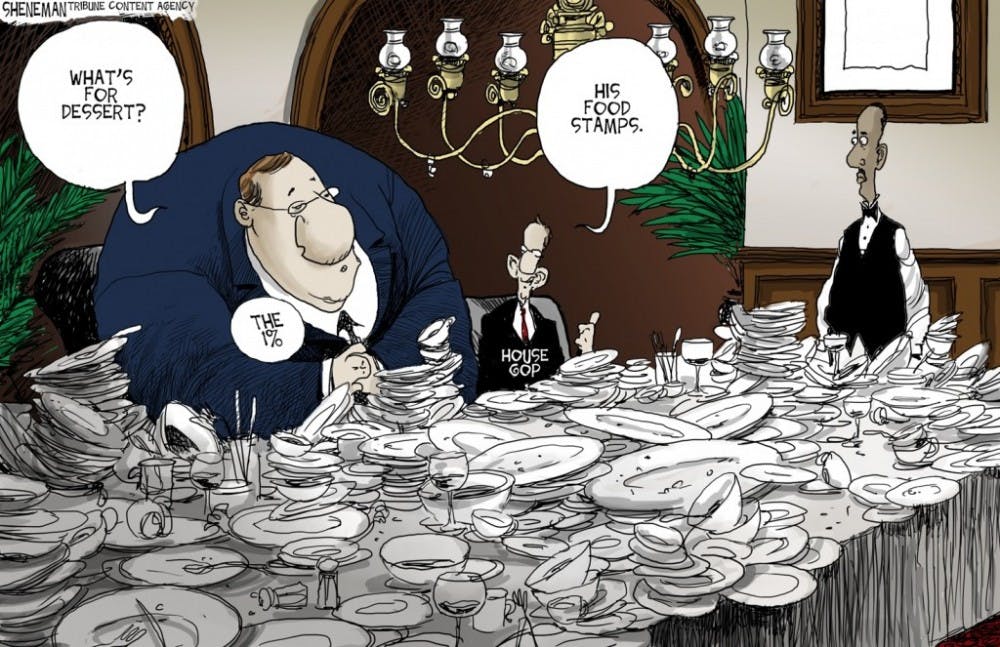“The world has become an idolator of this god called money.”
Pope Francis spoke these words a week ago, in an off-script speech to 20,000 out-of-work, increasingly desperate men and women in Sardinia, off the coast of Italy. And while his words may have been spoken halfway around the world, they rang true in cities all across the globe.
Nowhere are wealth and the wealthy more venerated than here in the United States. From celebrities to politicians to your neighbor down the street, the country is in agreement: You’re only worth it if you’re rich. But this mentality comes at a cost to millions of Americans, young and old. When we worship the wealthy, we fear the poor.
Just last week, Michigan state Sen. Joe Hune proposed a bill that would force welfare recipients to participate in mandatory volunteer service in exchange for their aid. Also known as a job.
But the Michigan poor don’t even get the respect to receive the classification of “employed.” They remain tax moochers, skimming off the hard work of “real Americans.”
But far more often than not, the people receiving welfare are people just trying to get by in a nation that has moved forward without bringing them along. Adjusted for inflation, minimum wage should be closer to $10.75 an hour and almost $22 when adjusted for productivity. Instead of a reasonable wage, low-level workers receive welfare and stigma.
Government handouts go to nearly every single American in one way or another. Whether it’s Medicare for the elderly, tax breaks for churches or subsidies for farmers, our money is distributed to other, potentially undeserving people on a daily basis. But as soon as the poor receive government funds, the torches come out, the pitchforks are raised and sweeping assumptions are made.
And here in North Carolina, poor families have little more respite. As of Monday, Loaves & Fishes Christian Food Ministry has shut its doors, leaving more than 7,000 Burlington residents scrambling to find somewhere new to feed their families. Details about the shut-down remain scarce, but it only increases pressure on poor people.
About a month ago, Raleigh-based Love Wins Ministries showed up at Moore Square to hand out breakfast biscuits and coffee, as they have every weekend for almost six years. But despite years of compliance with city laws, they were turned away by Raleigh police, as were several dozen of Raleigh’s homeless, eager for what may have been one of the few hot meals they would get that week.
City officials from all levels of the government assured Raleigh citizens — particularly surprised Love Wins members — that the event was a misunderstanding where no specific stance was taken by anyone in Raleigh’s government to deter the poor from getting fed.
But the Raleigh News & Observer uncovered emails that indicated the truth is quite different. Raleigh Parks and Recreation Director Diane Sauer wrote in one email that the small, weekly distribution was “out of control,” and Raleigh Police Lieutenant Kevin Carswell “laughed about” irritating and disbanding the group just trying to provide for the poor.
Unfortunately, this attitude isn’t uncommon. America has taken such a stance at this point that the poor are a non-entity in the public sphere. Or if they are mentioned, they are something to be feared, distrusted and destroyed.
The reality of the situation is not a simple fix. Like welfare, Medicaid or food stamps, no aid will be able to fully solve America’s problems. But the easiest fix, and the one most in need of attention, is our apathy toward the issue. Especially wrapped in the warm, $40,000-a-year insulation of Elon’s walls, the real, daily concern of poverty is easy to forget. But just outside our brick walls and across the train tracks, Burlington faces a 25 percent poverty rate and one less place willing to help its residents.
Concern for the poor is an increasingly unpopular topic, but it’s needed now more than ever. Raleigh city council members need to know we as a state and as a country have better things to do than deprive the city’s poor of a biscuit and a hot cup of coffee.
But it starts with just caring about them. Not caring for them, and certainly not paying for them. But our apathy toward almost every issue that faces America these days can only go so far. When one in four people just down the road can’t pay the bills, it’s time to do something, even if that just means treating them like people.


